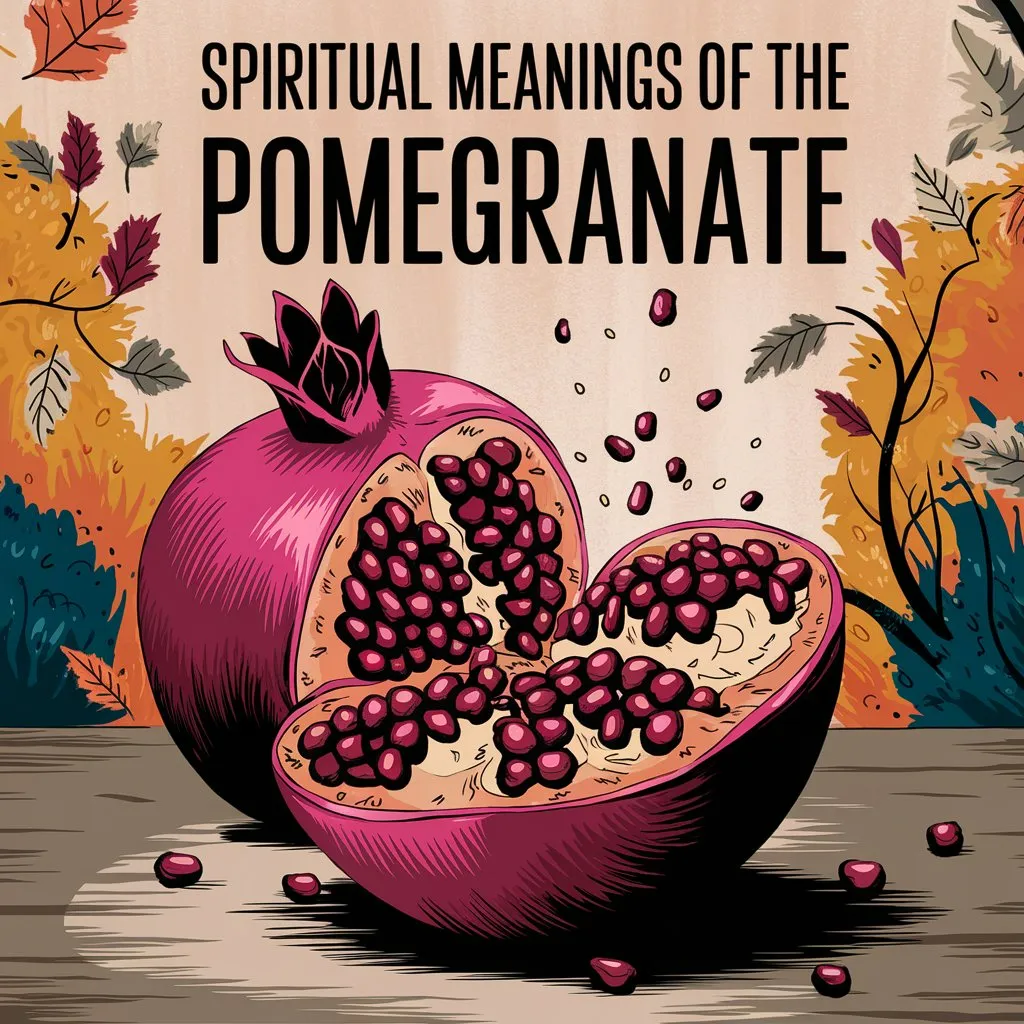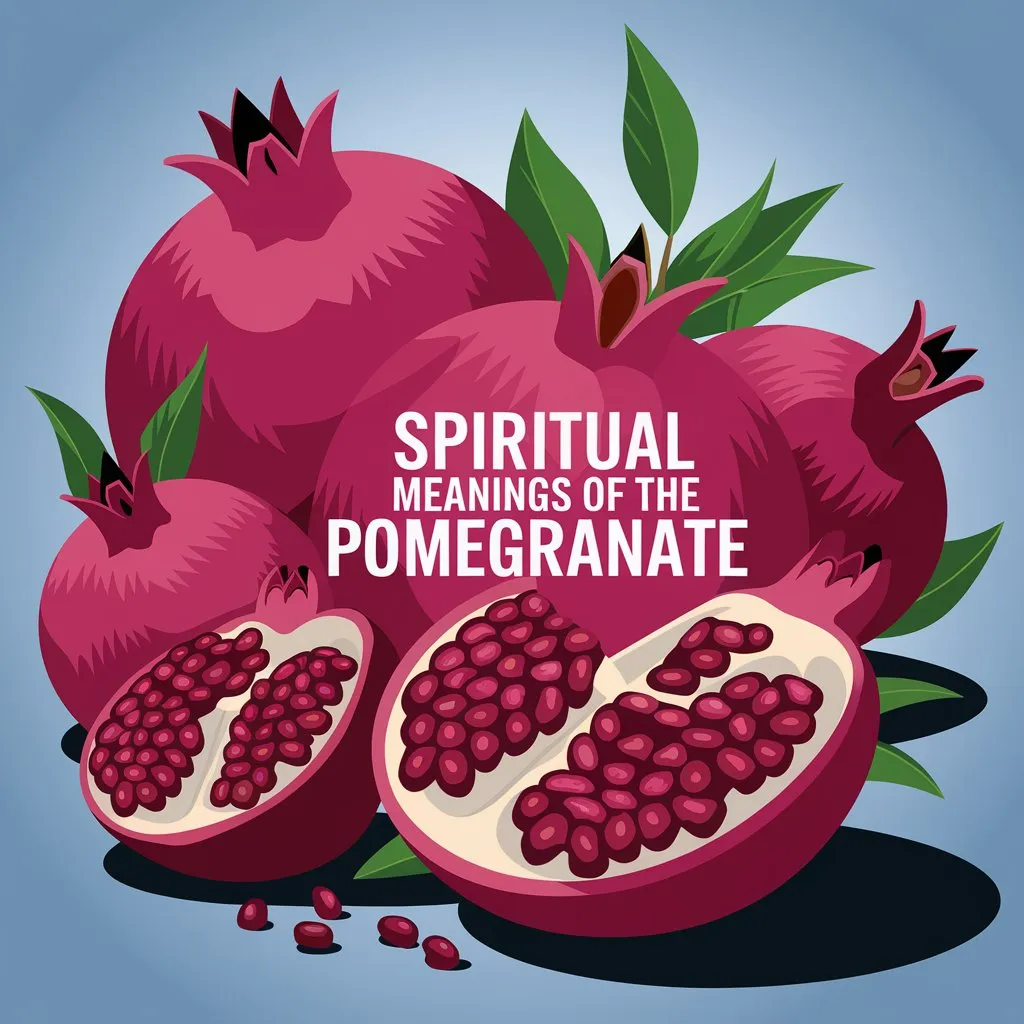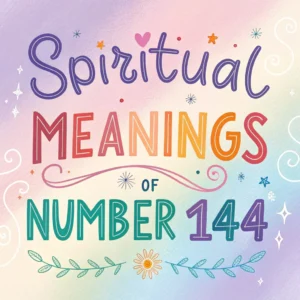The pomegranate is a fruit rich in symbolism across many cultures and spiritual traditions. With its vibrant red exterior and abundance of jewel-like seeds inside, the pomegranate has captivated human imagination for millennia.
The pomegranate has been revered as a sacred symbol in religions and cultures around the world for thousands of years.
As we delve into the spiritual meanings of the pomegranate, we’ll uncover layers of symbolism that speak to universal human experiences and aspirations.
Key Takeaways

- The pomegranate symbolizes fertility and abundance across many cultures
- It represents the cycle of life, death, and rebirth in various mythologies
- The fruit is associated with divine blessings and sacred feminine power
- Its structure reflects the relationship between the physical and spiritual realms
- Pomegranates feature prominently in religious iconography and sacred texts
- The fruit embodies paradoxical qualities like sweetness and tartness
- It serves as a metaphor for hidden knowledge and spiritual mysteries
- Pomegranates symbolize the unity of diversity through their many seeds
- The fruit represents transformation and spiritual awakening
- It is linked to concepts of paradise and heavenly realms
- Pomegranates hold significance in rituals and spiritual practices worldwide
1. Symbol of Fertility and Abundance
Across many cultures, the pomegranate is first and foremost a powerful symbol of fertility and abundance. Its numerous seeds represent the potential for new life and growth. In ancient traditions, the pomegranate was often associated with goddesses of fertility and used in rituals to promote conception and childbirth.
The fruit’s rich red color and juicy interior evoke images of vitality and plenty. Its abundance of seeds reflects nature’s generosity and the multiplying power of creation. As a fertility symbol, the pomegranate represents not just physical reproduction, but also the fertility of the mind and spirit – the ability to generate new ideas, projects, and creative works.
In Jewish tradition, pomegranates are said to contain 613 seeds, corresponding to the 613 commandments in the Torah. This reflects the idea of spiritual abundance and fruitfulness that comes from following divine teachings.
2. Cycle of Life, Death, and Rebirth
The pomegranate plays a central role in the Greek myth of Persephone, which explains the changing of the seasons. After being abducted by Hades, god of the underworld, Persephone ate pomegranate seeds, binding her to return to the underworld for part of each year. Her annual descent and return symbolize the cycle of death and rebirth in nature.
This myth reflects the pomegranate’s association with both the underworld and the return of life in spring. The fruit embodies the paradox of life emerging from death, as seeds must be buried in the earth to sprout new growth.
In many traditions, the pomegranate represents the hope of resurrection and renewal after death. Its blood-red juice evokes sacrifice, while its many seeds suggest new life waiting to emerge.

3. Divine Blessings and Sacred Power
In various spiritual traditions, the pomegranate is seen as a vessel of divine blessings and sacred power. Its lush interior filled with jewel-like seeds suggests hidden treasures and spiritual gifts waiting to be discovered.
The fruit is often associated with sacred feminine power and the nurturing, life-giving aspects of the divine. In some traditions, it represents the womb of the Great Mother goddess, containing the seeds of all creation.
Pomegranates feature prominently in religious iconography, often held by divine figures or adorning sacred spaces. In Christianity, depictions of the Virgin Mary sometimes show her holding a pomegranate, symbolizing the fullness of her grace.
4. Bridge Between Worlds
The pomegranate’s structure – a tough outer rind protecting the delicate seeds within – makes it a potent symbol for the relationship between the physical and spiritual realms. The exterior represents the material world, while the interior reflects hidden spiritual truths.
This symbolism extends to the human experience, with the pomegranate representing the soul contained within the body. Cracking open the fruit to reveal its seeds mirrors the process of spiritual awakening and self-discovery.
In some esoteric traditions, the pomegranate is seen as a gateway between worlds or dimensions. Its ability to bridge different realms makes it a powerful symbol in meditation and mystical practices.

5. Unity in Diversity
The pomegranate’s structure offers a beautiful metaphor for unity amidst diversity. Though composed of hundreds of individual seeds, they form a cohesive whole within the fruit. This reflects spiritual concepts of the interconnectedness of all things and the relationship between the individual and the universal.
In some traditions, the pomegranate represents the unity of the congregation or spiritual community. Each seed represents an individual believer, while the whole fruit symbolizes their shared faith and purpose.
This symbolism extends to ideas of cosmic unity, with the pomegranate representing the multitude of souls or beings that make up the universe, all contained within the divine whole.
6. Hidden Knowledge and Mysteries
The pomegranate’s complex interior structure, revealed only when the fruit is opened, has long made it a symbol of hidden knowledge and spiritual mysteries. Its many seeds represent esoteric wisdom waiting to be uncovered by the spiritual seeker.
In some traditions, the pomegranate is associated with forbidden knowledge or initiatory secrets. Its role in the myth of Persephone connects it to underworld wisdom – profound truths that can only be gained through challenging experiences.
The process of carefully extracting the seeds from a pomegranate mirrors the patient, dedicated work required to uncover spiritual truths. Each seed represents a fragment of divine wisdom to be savored and contemplated.

7. Paradox and Balance
The pomegranate embodies several paradoxical qualities, making it a symbol of balance and integration of opposites. Its seeds are both sweet and tart, reflecting the interplay of pleasure and pain in life. The fruit is associated with both fertility and death, abundance and sacrifice.
This embodiment of opposing forces makes the pomegranate a powerful symbol for spiritual wholeness and the integration of different aspects of the self. It represents the ability to hold seemingly contradictory truths in balance.
In some traditions, the pomegranate symbolizes the union of masculine and feminine energies. Its round shape and red color connect it to the feminine, while its crown-like top associates it with masculine solar symbolism.
8. Spiritual Transformation
The dramatic transformation of the pomegranate – from a tough, unassuming exterior to a burst of vibrant seeds – makes it a potent symbol of spiritual transformation and awakening. Opening the fruit represents the breaking open of the ego to reveal the soul’s true nature.
In alchemical symbolism, the pomegranate represents the culmination of the Great Work – the transformation of the base self into spiritual gold. Its red color connects it to the purifying fire of spiritual transformation.
The pomegranate’s association with Persephone also links it to themes of personal growth through challenge. Like Persephone’s journey to the underworld, cracking open the pomegranate can represent confronting one’s shadows to achieve greater wholeness.

9. Divine Love and Passion
The pomegranate’s lush red color and sweet-tart flavor have long associated it with love and passion. In many cultures, it is considered an aphrodisiac and used in love spells and rituals.
Beyond physical passion, the pomegranate also symbolizes divine love and the soul’s longing for union with the beloved. In mystical traditions, it represents the sweetness of spiritual ecstasy and the intoxicating nature of divine communion.
The Song of Solomon in the Bible uses pomegranate imagery to describe the beauty of the beloved, linking the fruit to sacred sensuality and the celebration of love as a spiritual practice.
10. Abundance and Prosperity
With its multitude of seeds, the pomegranate is a natural symbol of abundance and prosperity. In many cultures, it is used in rituals and practices aimed at attracting wealth and good fortune.
The fruit’s association with fertility extends to material abundance, representing the proliferation of resources and opportunities. Its rich color and juicy interior evoke images of luxury and plenty.
In some traditions, keeping pomegranates in the home is believed to invite prosperity and blessings. The fruit is often used as a decorative motif in art and architecture to symbolize abundance and good fortune.

11. Paradise and Heavenly Realms
Across various spiritual traditions, the pomegranate is associated with concepts of paradise and heavenly realms. Its lush, seed-filled interior evokes images of abundance and perfection in the afterlife or higher spiritual planes.
In Islamic tradition, pomegranates are described as fruits of paradise. Some legends claim that each pomegranate contains one seed that came directly from heaven.
The fruit’s role in the Persephone myth also connects it to the cyclical nature of paradise lost and regained. It represents both the temptations that can lead us away from our spiritual home and the promise of eventual return.
FAQs
What does the pomegranate symbolize in Christianity?
In Christian symbolism, the pomegranate represents the Church and its unity. The many seeds within one fruit reflect the many believers united in one faith. It is also associated with the blood of martyrs and Christ’s sacrifice, due to its red juice. Some traditions see it as a symbol of the fullness of Jesus’ suffering and resurrection.
How is the pomegranate used in Jewish traditions?
In Judaism, pomegranates are eaten on Rosh Hashanah to symbolize fruitfulness in the coming year. The fruit is said to have 613 seeds, corresponding to the 613 mitzvot (commandments) in the Torah. Pomegranates also adorn many Torah scrolls and other ritual objects as symbols of righteousness and good deeds.
What is the significance of pomegranates in Greek mythology?
In Greek myth, the pomegranate is closely associated with Persephone and the cycle of seasons. After being abducted by Hades, Persephone ate pomegranate seeds, binding her to return to the underworld for part of each year. This myth explains the changing seasons and connects the fruit to themes of death, rebirth, and the underworld.
How are pomegranates viewed in Islamic tradition?
In Islam, the pomegranate is mentioned in the Quran as one of the fruits of paradise. It is considered a symbol of beauty and divine blessing. Some traditions hold that each pomegranate contains one seed from paradise. The fruit is associated with abundance, fertility, and spiritual purity.
What does the pomegranate symbolize in Buddhism?
In Buddhist art and symbolism, the pomegranate represents the essence of favorable influences. It is one of the “three blessed fruits,” along with the citrus and peach. The pomegranate is associated with fertility, abundance, and the many-sided nature of the universe.
How is the pomegranate used in spiritual practices?
Pomegranates are used in various spiritual practices across cultures. They may be offered on altars, used in rituals for fertility and abundance, or incorporated into meditation practices. The act of mindfully opening and eating a pomegranate can be a spiritual exercise in itself, symbolizing the uncovering of hidden wisdom.
What does it mean to dream about pomegranates?
In dream interpretation, pomegranates often symbolize fertility, abundance, and hidden potential. Dreaming of pomegranates might indicate upcoming opportunities or the need to look beneath the surface in some area of your life. The state of the pomegranate in the dream (ripe, unripe, broken open) can offer additional insights into its meaning.
Are there any negative associations with pomegranates in spirituality?
While pomegranates are generally seen positively, they can have some negative associations. In some interpretations of the Persephone myth, the pomegranate represents temptation and the loss of innocence. Its blood-red juice can also connect it to themes of sacrifice and suffering in some contexts.
How can I incorporate the spiritual symbolism of pomegranates into my life?
You can meditate on the pomegranate’s symbolism by mindfully eating the fruit, reflecting on its structure and taste. Consider keeping pomegranates or their images in your home as reminders of abundance and spiritual potential. You might use pomegranate imagery in art or journaling as a tool for self-reflection and growth.
What is the connection between pomegranates and the divine feminine?
Pomegranates are often associated with goddesses and female spiritual figures across cultures. Their shape and structure connect them to the womb and feminine creative power. In many traditions, they represent the nurturing, life-giving aspects of the divine feminine, as well as hidden wisdom and intuitive knowledge.

Hello, I’m Zephyra, your guide at SpiritualityEssence.com. I’m passionate about uncovering life’s mysteries and sharing transformative insights. Let’s explore mindfulness, ancient rituals, and the path to a more awakened life together. Join me on this spiritual journey!




















